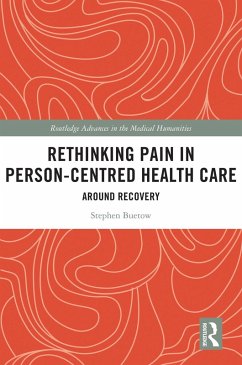
The Public Shaping of Medical Research (eBook, PDF)
Patient Associations, Health Movements and Biomedicine
Redaktion: Wehling, Peter; Koenen, Sophia; Viehöver, Willy
Versandkostenfrei!
Sofort per Download lieferbar
41,95 €
inkl. MwSt.
Weitere Ausgaben:

PAYBACK Punkte
21 °P sammeln!
Patient organizations and social health movements offer one of the most important and illuminating examples of civil society engagement and participation in scientific research and research politics. Influencing the research agenda, and initiating, funding and accelerating the development of diagnostic tools, effective therapies and appropriate health-care for their area of interest, they may champion alternative, sometimes controversial, programs or critique dominant medical paradigms. Some movements and organizations advocate for medical recognition of contested illnesses, as with fibromyalg...
Patient organizations and social health movements offer one of the most important and illuminating examples of civil society engagement and participation in scientific research and research politics. Influencing the research agenda, and initiating, funding and accelerating the development of diagnostic tools, effective therapies and appropriate health-care for their area of interest, they may champion alternative, sometimes controversial, programs or critique dominant medical paradigms. Some movements and organizations advocate for medical recognition of contested illnesses, as with fibromyalgia orADHD, while some attempt to "de-medicalize" others, such as obesity or autism.
Bringing together an international selection of leading scholars and representatives from patients' organizations, this comprehensive collection explores the interaction between civil society groups and biomedical science, technology development, and research politics. It takes stock of the key findings of the research conducted in the field over the past two decades and addresses emerging problems and future challenges concerning the interrelations between health movements and patient organisations on the one hand, and biomedical research and research policies on the other hand. Combining empirical case studies with conceptual discussion, the book discusses how public participation can contribute to, as well as restrict, the democratization of scientific knowledge production.
This volume is an important reference for academics and researchers with an interest in the sociology of health and illness, science and technology studies, the sociology of knowledge, medical ethics or healthcare management and research, as well as medical researchers and those involved with health-related civil society organizations.
Bringing together an international selection of leading scholars and representatives from patients' organizations, this comprehensive collection explores the interaction between civil society groups and biomedical science, technology development, and research politics. It takes stock of the key findings of the research conducted in the field over the past two decades and addresses emerging problems and future challenges concerning the interrelations between health movements and patient organisations on the one hand, and biomedical research and research policies on the other hand. Combining empirical case studies with conceptual discussion, the book discusses how public participation can contribute to, as well as restrict, the democratization of scientific knowledge production.
This volume is an important reference for academics and researchers with an interest in the sociology of health and illness, science and technology studies, the sociology of knowledge, medical ethics or healthcare management and research, as well as medical researchers and those involved with health-related civil society organizations.
Dieser Download kann aus rechtlichen Gründen nur mit Rechnungsadresse in A, B, BG, CY, CZ, D, DK, EW, E, FIN, F, GR, HR, H, IRL, I, LT, L, LR, M, NL, PL, P, R, S, SLO, SK ausgeliefert werden.













